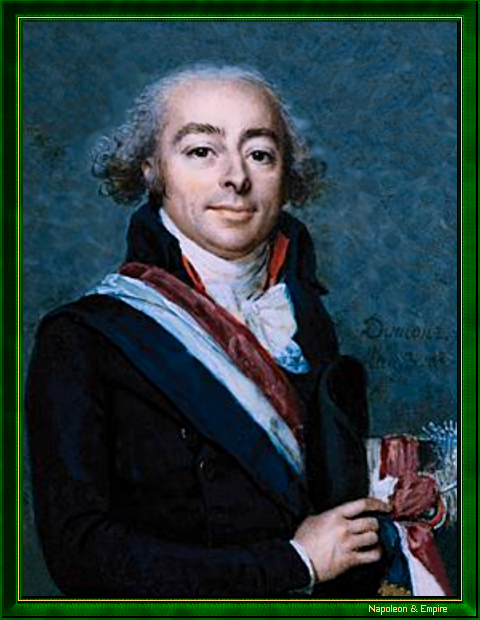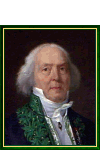François Antoine Boissy d'Anglas
Count of the Empire
Pronunciation:

François Antoine Boissy d'Anglas (born December 8, 1756 in Saint-Jean-Chambre, Vivarais) suffered from a crippling stammer when he was elected to the Estates-General and then to the Convention. During the King's trial, he voted in favor of appealing to the people, banishment and a stay of execution, just as he protested against the arrest of the Girondins, but he was able to stroke Maximilien Robespierre in the right direction.
After the fall of Robespierre, he was finally able to reveal his hostility to the Terror. He joined the Comité de Salut Public, which had been cleansed of its terrorist elements, reopened the Stock Exchange and re-established freedom of worship without external signs.
As President of the Convention on the day of the riot of Prairial 1st, Year III (May 20, 1795), he was presented with the head of deputy Jean Bertrand Féraud, who had just been massacred, planted on a pike. He stood up and greeted her respectfully. His courage and cool-headedness earned him great popularity among his fellow deputies.
Although he was merely rapporteur for the eleven-member commission tasked with drafting a new constitution, he was credited with its creation, while Pierre Daunou defended it before the Convention.
Elected to the Conseil des Cinq-Cents, but affiliated with the Clichy club (moderate members of the Convention), he fell victim to the repression of royalists after the coup of 18 fructidor. Hiding and escaping deportation, he became a prisoner when he sensed the end of the Directoire.
The First Consul Napoleon Bonaparte, who held him in high esteem, granted him amnesty, and he was elected to the Tribunate and then to the Senate in 1804. The Emperor made him a Comte d'Empire in 1808.
This did not prevent Boissy d'Anglas from endorsing Napoleon I's deposition in 1814...
Made a peer of France by King Louis XVIII, he rallied to the Emperor during the Hundred Days before being reinstated to the peerage by the King, who knew that Boissy d'Anglas had always been a royalist at heart.
François Antoine Boissy d'Anglas died in Paris on October 20, 1826. His tomb is in the 28th division of the Père-Lachaise cemetery .
"François Antoine Boissy d'Anglas" by François Dumont the Elder (Lunéville 1751 - Paris 1831).

His role as peacemaker during the White Terror of 1815 was undeniable. A Protestant by birth, he defended Huguenots against Catholic protests. Vice-president of the Bible Society, he was a member of the Consistory of the Reformed Church of France from 1803 to his death.
Adresse
5, Rue de Beaune. Paris VIIème arrondissement
This is where Conventionnel Boissy d'Anglas stayed in 179313, Rue de Choiseul. Paris IIème arrondissement
According to the Imperial Almanach of 1811, Boissy d'Anglas was living here at that dateAcknowledgments
This biographical notice was written by Mrs. Marie-Christine Pénin (see her website Tombes et Sépultures), and posted online with her kind permission. She also kindly provided us with the photo of the Count's burial.Other portraits

"François Antoine Boissy d'Anglas". School of Jean-Auguste-Dominique Ingres.